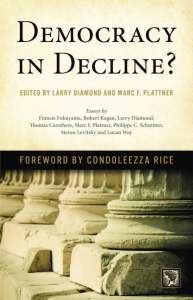Guest post by Condoleezza Rice
To celebrate the recent publication of Democracy in Decline?, edited by the Journal of Democracy’s Larry Diamond and Marc F. Plattner, we are pleased to offer this excerpt from the book’s Foreword by Condoleezza Rice. Don’t miss this collection of essays by eight of the world’s leading public intellectuals and scholars of democracy—Francis Fukuyama, Robert Kagan, Philippe C. Schmitter, Steven Levitsky, Lucan Way, Thomas Carothers, and editors Larry Diamond and Marc F. Plattner.
 For the past quarter-century, the Journal of Democracy has helped the world to understand the controlled chaos that is democracy. Like the many scholars who have written for the Journal, I care deeply about the fate of this system of governance that protects liberty and have studied its ups and downs.
For the past quarter-century, the Journal of Democracy has helped the world to understand the controlled chaos that is democracy. Like the many scholars who have written for the Journal, I care deeply about the fate of this system of governance that protects liberty and have studied its ups and downs.
In more recent years, as secretary of state, I found myself defending the proposition that all people should live in freedom and that US policies should reflect that belief. It was not difficult to get agreement to the principle. Yes, it was best if human beings could say what they thought, worship as they pleased, be free from the arbitrary power of the state, and have a say in who would govern them. After all, who would argue that some people should be condemned to live in tyranny?
Yet if one scratched the surface, there was rampant skepticism that democracy is right everywhere, at all times, and for all peoples. One was reminded that cultural explanations once branded Africans as too tribal, Asians too Confucian, and Latin Americans too drawn to caudillos to create stable democracies. Those arguments now belong to the past, but a hint of them hangs over the discussion of the events in the Middle East. The Arab Spring has led to disappointment, and democracy seems overmatched by sectarianism, state collapse, and a palpable nostalgia for a more orderly, if authoritarian, time.
But it is undeniable that democracy retains its power to appeal to those who do not yet enjoy its benefits. People are willing to face persecution and imprisonment, exile, and even death just for a chance to live a life in liberty, even in the chaotic Middle East.
* * * * *
So what should democracy advocates do? Since its first issue, the Journal has provided insights on this question for students, scholars, and policymakers alike. The essays in this volume will advance and challenge your thoughts about the prospects of democracy today. We are reminded that those who believe in the enterprise must find a better way to assist in building state-capacity. We are challenged to find ways to use foreign aid to support efficiency and transparency of young governments. We are cautioned not to think that the long arc of history will inevitably favor freedom.
We can certainly do better in supporting new democratic states and helping them to govern more effectively. But most likely, we will also need to find an abundance of patience. It is not easy for people who have just seized their rights to write rules of the political game that are fair and transparent. It is not easy for majorities to use their newly won freedoms to advocate for the rights of minorities. It is not easy for traditional patriarchal societies to accept the idea that the protection of individual rights must be gender neutral. And it is not easy for people to put aside painful, and often violent, societal divides and learn to trust impartial institutions and the rule of law to resolve differences.
Still, count me as optimistic about democracy’s future. Alternatives might earn some temporary legitimacy by providing efficient governance in the short run. But eventually there will be challenges and problems and popular pressure for a different course: That is the authoritarian’s nightmare, because—unlike in democracies—there is no peaceful way for the people to change the government.
We must also maintain historical perspective, recognizing the remarkable geographic reach of democracy’s march over the past decades. Chile and Colombia, Senegal and Ghana, Japan, South Korea, and Indonesia have given an answer to those who thought that democracy could take root only where Europe’s Enlightenment had prepared the ground.
And Americans, of all people, should be patient. The odds were surely long that the descendants of slaves would win their rights through appeal to the US Constitution that once counted their ancestors as three-fifths of a man. That is a recent development, of course. We have just celebrated fifty years since Selma and the Voting Rights Act, marking the United States’ second democratic transition.
So, while those of us who are lucky enough to live in freedom have the right to question its promise, we should not forget that people who do not yet enjoy its benefits still seem determined to win it. That is the greatest reason for optimism that democracy is not permanently in decline. And it is a call to redouble our commitment to the proposition that no one should live in tyranny—even if the road ahead is hard and long.
Condoleezza Rice served as the 66th United States Secretary of State.
Use promo code HDPD to receive a 30% discount when you order your copy of Democracy in Decline? on our website or by calling 800-537-5487.
